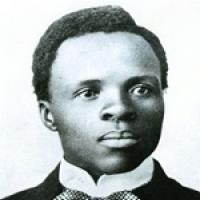Today in Kimberley's History
|
|
|
|
|
General Secretary of the ANC, journalist and writer, Solomon Plaatje dies - 1932
Solomon Tshekisho Plaatje was a South African writer, linguist, translator and political leader. Plaatje died of pneumonia at the age of 55 while on a trip to Johannesburg. He was buried at West End Cemetery in Kimberley. Kimberley City municipality is now named the Sol Plaatje Municipality. Plaatje was a prolific journalist and writer and in 1912 became first secretary-general of the South African Native National Congress (SANNC), which in 1923 became the African National Congress (ANC). Plaatjie’s contributions to literature include his translation of Shakespeare's Comedy of Errors, Julius Caesar, and Much Ado about Nothing into Tswana and published the widely acclaimed book, Native life in South Africa documenting the experiences of black farmers forced off the land following the passing of the Land Act in 1913. |
The Native Land Act is passed - 1913
The Natives Land Act (No. 27 of 1913) was passed to allocate only about 7% of arable land to Africans and leave the more fertile land for whites. This law incorporated territorial segregation into legislation for the first time since Union in 1910. The law created reserves for Blacks and prohibited the sale of territory in white areas to Blacks and vice versa. An annexure designated the territory initially allocated to Blacks, with a provision that a commission was to investigate the matter further for a more realistic delimitation. In effect, over 80% went to White people, who made up less than 20% of the population. The Act stipulated that Black people could live outside the reserves only if they could prove that they were in employment. Although the law was applicable to the whole of South Africa, in practice it applied only to the Transvaal and Natal. In the Free State, such legislation was already in force since 1876, while a law forbidding Blacks to own property in the Cape would have been in conflict with the constitution of the Union of South Africa, as Cape property-ownership was one of the qualifications for Black franchise. Sharecropping on farms in the Transvaal and the Orange Free State was forbidden. According to debates in Parliament, the Act was passed in order to limit friction between White and Black, but Blacks maintained that its aim was to meet demands from White farmers for more agricultural land and force Blacks to work as labourers.
The Natives Land Act (No. 27 of 1913) was passed to allocate only about 7% of arable land to Africans and leave the more fertile land for whites. This law incorporated territorial segregation into legislation for the first time since Union in 1910. The law created reserves for Blacks and prohibited the sale of territory in white areas to Blacks and vice versa. An annexure designated the territory initially allocated to Blacks, with a provision that a commission was to investigate the matter further for a more realistic delimitation. In effect, over 80% went to White people, who made up less than 20% of the population. The Act stipulated that Black people could live outside the reserves only if they could prove that they were in employment. Although the law was applicable to the whole of South Africa, in practice it applied only to the Transvaal and Natal. In the Free State, such legislation was already in force since 1876, while a law forbidding Blacks to own property in the Cape would have been in conflict with the constitution of the Union of South Africa, as Cape property-ownership was one of the qualifications for Black franchise. Sharecropping on farms in the Transvaal and the Orange Free State was forbidden. According to debates in Parliament, the Act was passed in order to limit friction between White and Black, but Blacks maintained that its aim was to meet demands from White farmers for more agricultural land and force Blacks to work as labourers.

